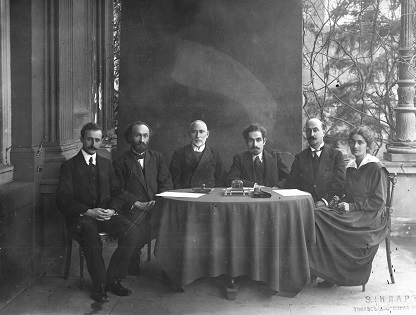Georgian archive showcases women in politics in 1919-1921

At the beginning of the 1900's when Georgia tried to escape from the grips of the Russian Empire and establish itself as an independent republic based on democratic principles and values, local women were actively engaged in this process.
To celebrate Women’s History Month and honour the memory of the first women in politics in modern Georgia, the Women’s Information Centere (WIC) and the National Archives of Georgia are managing an exhibition named ‘Women Members of the Constituent Assembly 1919-21’.
Unique photos and documents from the archive of this period will go on display on March 19, at 18:30 in the Tbilisi City Assembly building.
In 1919, following the general, democratic elections, the Independent Republic of Georgia elected the Constituent Assembly (Parliament), the national legislative body of Georgia. It was marked by equal suffrage, women’s participation in the elections, and other democratic elements.
After an amendment to the initial number of 130 delegates of the Constituent Assembly, the mandate of the delegates was granted to 145 citizens. Of this number five were females from Social Democrat parties, which represented an absolute majority in the Assembly.
Those 145 delegates have remained to be the last and only legal representatives of the Georgian population during Georgia's 70 years of occupation.
Those five Georgian women who were actively were engaged in Georgian political affairs were: Elisabeth Nakashidze-Bolkvadze, Minadora Orjonikidze-Toroshelidze, Kristine (Chito) Sharashidze, Anna (Ola) Sologhashvili and Eleonora Ter-Parsegova-Makhviladze.
As well as the fact these five women were member of Georgia’s first Parliament, they fought against the Russian Empire and for this they were imprisoned and resettled several times.
At the beginning of the 20th Century, Nakashidze-Bolkvadze became a member of Georgia's Social Democratic Party. She worked among peasants in Guria. In 1905 she supported the Mensheviks when the rift appeared in the party.
On March 20, 1917 she was elected chair of the Gurian Women's Society. Two years later she was elected to the Georgian Democratic Republic's founding congress under the Social Democratic Party list.
For taking part in anti-Soviet activities she was arrested and exiled. In 1937 she was executed in Krasnoyarsk on charges of leading a counterrevolutionary organisation.
Female members of the Constituent Assembly were intellectual, bold and educative women who fought for freedom of their homeland.

A session of Georgian Constituent Assembly (Parliament). Anna (Ola) Sologhashvili sitting in the second row on left. Photo from Georgia's National Archive.
Orjonikidze-Toroshelidze was educated in Geneva University. She was active in Geneva's socialist circles and supported the Russian Communist émigré newspaper Iskra. In 1918 she became a legislator and was among the signatories of the Georgian Democratic Republic's declaration of independence.
After the Bolshevik takeover, she joined an underground anti-Soviet organisation. In the coming years her husband and children were killed in the repressions and Minadora herself was resettled several times.
Sharashidze actively participated in revolutionary demonstrations in Tbilisi in 1905-06 and prepared newspaper materials in this period. After Georgia's Sovietisation she was imprisoned several times. Her family died in the repressions.
Furthermore, she did research and wrote important works on the history of Georgian printing and regional history. She studied and catalogued over 1,500 manuscripts dating from the 9th to 19th centuries.
The exhibition is being held within the project named ‘Women as Agents for Change and Empowerment’. The project, which promotes women’s political participation and supports their political and economic empowerment, is being implemented by the Women’s Information Centere (WIC) with the financial support of the United States Agency for International Development (USAID).
 Tweet
Tweet  Share
Share